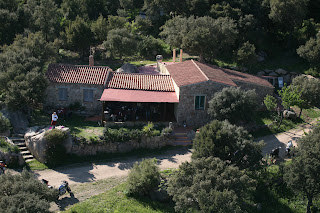Armungia is a small village on the highlands of Gerrei, in the south-east of Sardinia.
In our workshop we knead Sardinian sheep wool, that sometime we enjoy dyeing by ourselves at home, with plants and fruits from natural flora of our territory (walnut, pomegranate, elderberry, fig leaves, an so on). Traditional weaving is realised on horizontal wood looms, using the so called “a litzos” or “launched weaves” technique.
Laying the warp is a hand made traditional work and it is realized
alongside Casa Lussu’ courtyard walls.
The warp threads pass through a system of heddle eyes that are connected
to some pedals which produce different interweaving.
In this way, each fabric becomes a unique piece of work, thanks to the
assortment of motifs and to the variety of weave yarn: wool, linen, cotton of
every kind of thickness and coloration.
Until the 60s, weaving teaching was handed down orally. In Armungia some
weavers began to schematize these designs on paper.
.jpg)
.jpg)









































